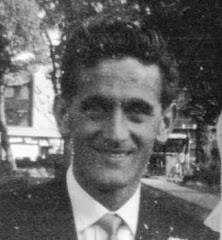As 1939 drew to a close
Tuesday, 29 December 2009
The Coming of the War Years
As the 30’s were coming to a close the threat of war looming. The first sign was the delivery of shaped corrugated iron sheets to the houses in our road, in turn workmen arrived,dug a large hole, bolted the parts together, covered it with soil and this was now an Anderson shelter. Plans were now afoot for the evacuation of all children under 14 to the countryside for safety and in late July two of my sisters and myself were evacuated to a small village called Flamstead in Hertfordshire.
This was a very sad day for the family and in a matter of weeks war was declared. This was to be the quiet before the storm. Even at the tender age of 10 music was influencing my life, being a great comforter on many a lonely evening as we listened to the radio in the parlour. Vera Lynn would bring a lump to my throat with her programme addressed to us evacuees with songs to suite, but the song that haunts me even to this day is “Somewhere Over the Rainbow” sung by Judy Garland.
Celebration Days in the 30’s
Monday, 28 December 2009
Everyday Life in the 30's
As we moved on in the 30s’things were changing fast. The film industry was expanding and the new Odeon cinema was near completion at Dalston. This meant there were nine cinemas within walking distance of each other, plus the two music halls (Hackney Empire and Alexander palace).
This also heralded the start of the changeover of the tram to the new trolleybuses. It was an exciting time for us watching all the work progressing. As the first of the new buses appeared a new source of income emerged The typical road layout for the trams was 2 triple tracks (the centre one being a conductor via a slot in the middle). There was usually enough room between the tram and the pavement for a vehicle to pass,but getting on and off the tram could be a little hairy. The road surface on the local tram route was in two parts ,on either side of the tracks consisted of stone cobbles,and the tracks were set in treated bricksize hardwood blocks.
When the work to remove the tracks began the wood became scrap, and was fair game for me and my scavenging mates. These blocks had been impregnated with a flammable liquid and coated with a thick coating of bitumen. We would collect them by the armful dodging the workmen and then using my dad’s chopper to cut our “tarry blocks“ in half. The fact that they burnt fiercely on open fires made them good sellers.




